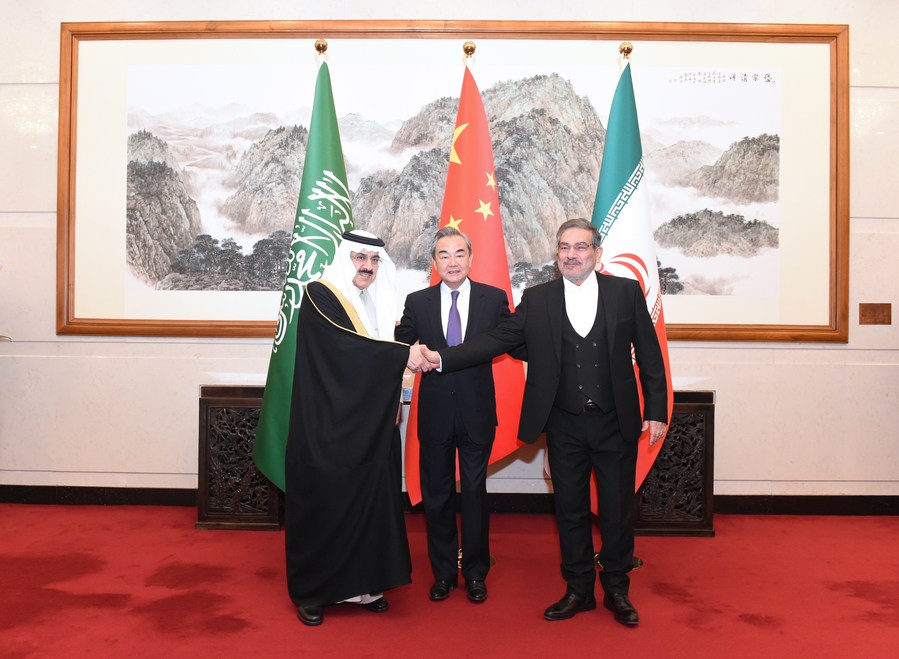Dialogues, consultation have strength in resolving conflicts

Wang Yi (C), a member of the Political Bureau of the Communist Party of China (CPC) Central Committee and director of the Office of the Foreign Affairs Commission of the CPC Central Committee, attends a closing meeting of the talks between the Saudi delegation led by Musaad bin Mohammed Al-Aiban (L), Saudi Arabia's Minister of State, Member of the Council of Ministers and National Security Advisor, and Iranian delegation led by Admiral Ali Shamkhani (R), Secretary of the Supreme National Security Council of Iran, in Beijing, capital of China, March 10, 2023. (Xinhua/Luo Xiaoguang)
Saudi Arabia and Iran recently signed a joint statement in Beijing, with which the two countries announced the resumption of diplomatic relations.
Since they held talks in Beijing in March, the two sides have made new strides in improving bilateral relations in accordance with the roadmap and timetable laid out in their Beijing agreement.
The improved ties between the two countries are believed to be a significant matter of the evolving international relations today, which not only opened a path for peace and stability in the Middle East and set an important example for countries to use dialogue and consultation to resolve their conflicts and differences, but also demonstrate how major countries should responsibly resolve international hotspot issues and safeguard world peace.
The international community gave high recognition to the important results achieved in the Beijing agreement between Saudi Arabia and Iran, believing that the agreement marked an important step of turning conflicts in the Middle East into reconciliation.
The major diplomatic breakthrough is constantly releasing its positive influence, creating new opportunities for the political resolution of regional hotspot issues. "Ice-breaking dialogues" have frequently made the headlines in the Middle East.
This fully proves that the Middle East, a region torn by wars and turbulence, aspires to peace and security. The will and capability of countries in the region to safeguard peace and security through enhancing solidarity and coordination are on a rise.
Ezzat Saad, director of the Egyptian Council for Foreign Affairs, noted that people in the Middle East have long suffered from wars and they long for peace. Seeking peace and development has become a mainstream voice of regional countries especially in the recent years, the director added.
Countries in the Middle East should keep the future and destiny of the region firmly in their own hands, which is conducive to the peace and stability in the Middle East and the world at large.
However, the reaction of a few major countries to the improved ties between Saudi Arabia and Iran is completely different from that of most countries in the world. In an unannounced visit to Saudi Arabia earlier this month, William Burns, director of the Central Intelligence Agency, aired Washington's "frustration" at being left out of regional developments after Riyadh moved to restore ties with Iran and Syria, according to The Wall Street Journal. He reiterated that Iran and Syria are still under heavy sanctions from the United States.
The U.S. "frustration" is not surprising at all. German daily newspaper Junge Welt said that Washington is not seeing any benefits from the improved ties between Saudi Arabia and Iran, and the Beijing agreement between the two countries will make it more difficult for the United States to implement the "divide and rule" tactics in the Middle East.
The United States has long taken the Middle East as a strategic chessboard, on which regional countries are all viewed by it as chess pieces. Stoking tensions and creating divisions, it is a major source of turbulence in the Middle East.
A recent article published on The Guardian about the 20th anniversary of the U.S.-led invasion of Iraq noted that the “war on terror” provided political cover for the further pursuit of supremacy, and the political system planted in Iraq by Washington has intensified divisions and made it practically ungovernable.
The international community is highly alert to the U.S. practices of stoking conflicts and benefiting from them. Its awareness of maintaining strategic independence is rising. The improved relations between Saudi Arabia and Iran well proves this. The more solidarity the countries in the Middle East have, the less space there will be for external forces to pursue offshore balance, divide and rule, and maintain hegemony and private interests.
On a renowned question-and-answer website, a user asked why China was able to broker a truce between Saudi Arabia and Iran while the U.S. failed to do such a thing. An answer winning a lot of upvotes noted that China likes peace but the U.S. doesn't want it.
Military force is not a solution, and zero-sum game can never bring lasting peace. Upholding dialogues and strengthening communication holds the key to resolving differences. Only results achieved from equal consultation are the most sustainable.
Following the Beijing agreement between Saudi Arabia and Iran, a foreign media outlet pointed out that dialogues are the most powerful weapon, which helps achieve peace better than however many troops. All relevant parties have seen the new hope to resolve international hotspot issues from the Chinese philosophy and actions that prioritize dialogues, diplomacy and peace.
China advocates the Global Security Initiative (GSI), calls on countries to adapt to the profoundly changing international landscape in the spirit of solidarity, and champions the win-win mindset to address the complex and intertwined security challenges, so as to eliminate the root causes of international conflicts and improve global security governance. The Beijing agreement just marked a successful practice of the GSI.
Major countries shoulder special responsibility for world peace and stability. They should always use their resources and strength to promote dialogues and reconciliation, rather than the other way around.
Egyptian newspaper Al-Ahram said the Beijing agreement heralded the birth of the Chinese solution based on peace and understanding, adding that China is committed to seeking common ground while putting differences aside and to safeguarding common interests. It said the Chinese solution was obviously fairer and better for handling international and regional issues compared with U.S. approaches of seeking interests by provoking troubles and wars.
Factors of instability, uncertainty and insecurity are increasing in the international situation. The reconciliation between Saudi Arabia and Iran told the world that constructive dialogues and peace talks are the best approach to resolving conflicts and promoting peace. No matter how complex the issues are or how thorny the challenges may be, equal-footed dialogue on the basis of mutual respect will lead to a mutually acceptable solution. To resolve differences and conflicts through dialogues and consultation and jointly safeguard peace remains the right choice of human beings.
Photos
Related Stories
- Special envoys raise hopes for peace
- China's Global Security Initiative to help world combat security challenges, ensure sustainable peace: experts
- To build a better future that enjoys lasting peace, universal security
- Security paper demonstrates China's resolve to defend global security
- Paper details way to achieve world peace
Copyright © 2023 People's Daily Online. All Rights Reserved.









